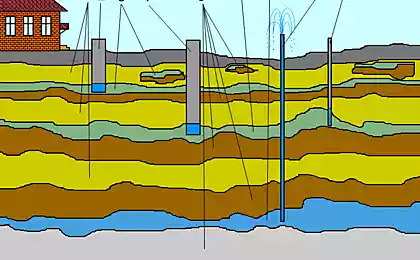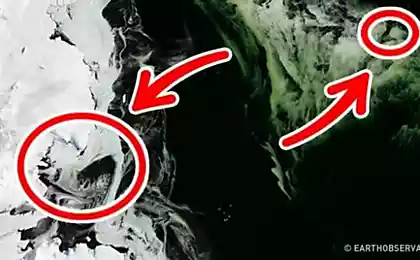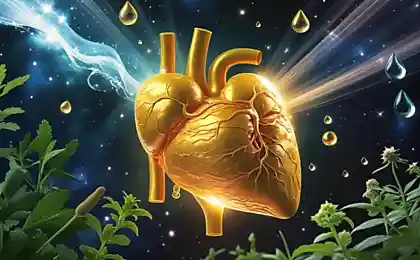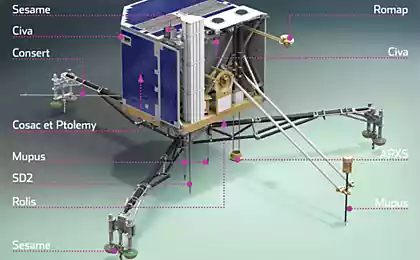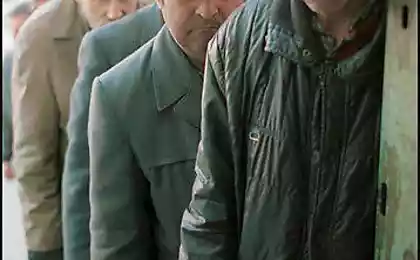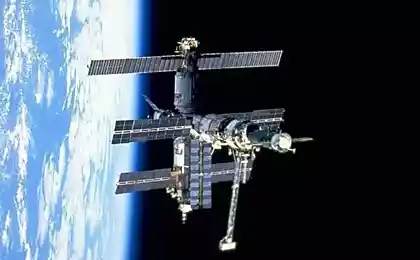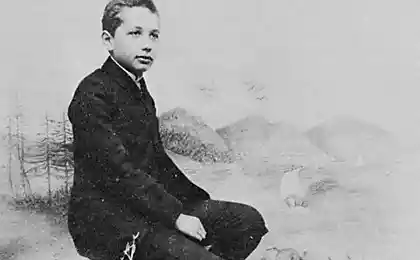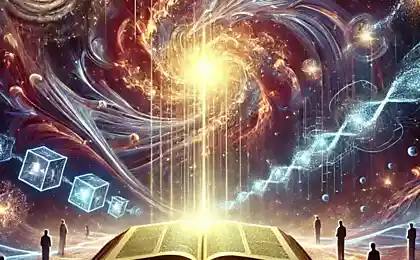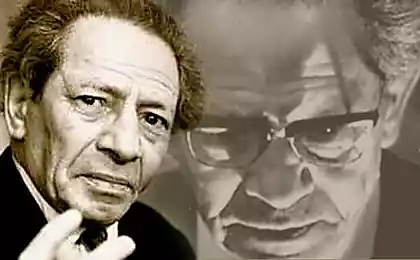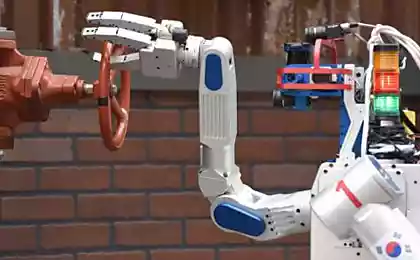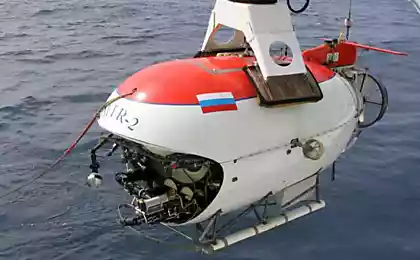510
Professor Dominique Bourg: As the anthropocene is changing the world
The French philosopher Dominique Bourg on how the anthropocene is changing the world in which less and less space for humans.
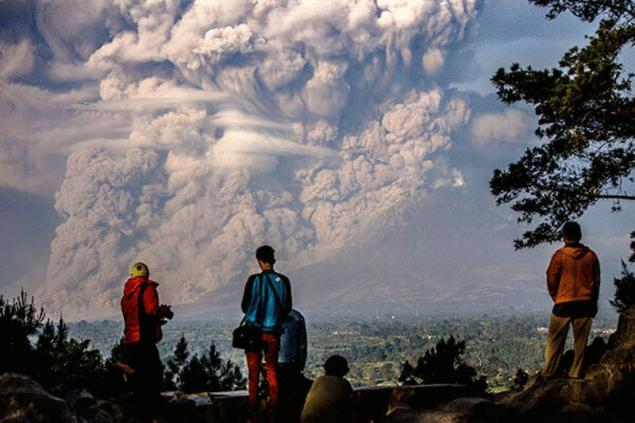
Photo: Antara Photo Agency / Reuters
Professor of law, University of Lausanne, French philosopher and expert on climate protection, Dominique Bourg held in the French Institute lecture, in which he described how people change the environment and how to change the life of all humanity into a new geological epoch — the anthropocene. He not only warned of impending extreme weather events all around the world, but also outlined the dramatic changes that will occur in society in connection with them. "Ribbon.ru" recorded the basic provisions of lecture of Dominique Boer.
What is the anthropocene
There is now a very fashionable word — "the anthropocene". The anthropocene is a new geological era, which has entered humanity, lived before the Holocene epoch. The Holocene lasted approximately 11 million years — it was at this time began and ended the big ice age. In this era of climate change occurred without influence on the climate of human activities.
Recently we have entered a new period — the anthropocene, changed the conditions of life on the planet. Some believe that global warming is a positive factor, especially for the Nordic countries, but in fact it is no good carries. For the Holocene was characterized by a stable climate, favourable conditions for agriculture, and on the basis of agriculture developed a great civilization. For centuries humanity has used this situation, these favourable conditions.
But with the beginning of the anthropocene the Holocene has ended and the conditions are totally changed. The anthropocene can be described in terms of three disciplines. First, the stratigraphy section of the Geology layers of sedimentary rocks and the geologic time scale, second, Sciences about the Earth as the system and, thirdly, the so-called "artificialization" how man changed the face of the planet. The anthropocene continues, and every decade we see something new.
In comparison with the beginning of the industrial revolution, carbon dioxide in the atmosphere has increased by 40 percent. Returning tens of millions of years ago, we will see that during this period there were such major changes, as with the 1830-ies to the present day. Clearly, if over millions of years the changes were minor, and all of a sudden there was a splash, then on the Ground really is something enormous.
Another important indicator is the increase of the mass of nitrogen and phosphorus compounds. NOx was three times higher than before human activities. This is particularly evident in some regions. There is a concept "demonstration mountain lakes" (they are in isolated mountainous regions), and in their water and in the coastal zone, there has been growth of a population of unicellular diatoms assimilate salts of nitrogen and phosphorus, indicating that the increase in the concentrations of these elements in the environment. And it takes away from regions where there is industrial activity of man.
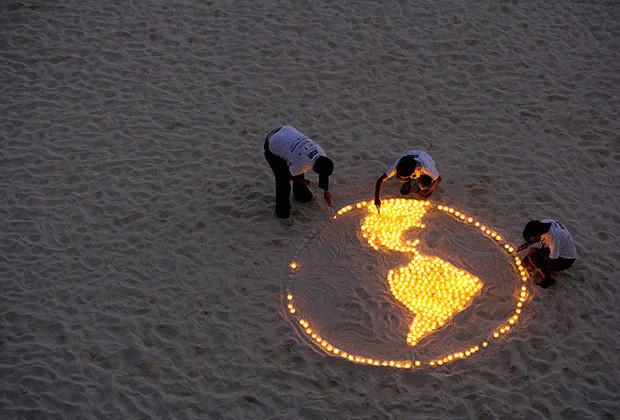
Photo: Gerardo Garcia / Reuters
Try to imagine what will happen in the future, if these processes will continue. During the year a person produces more of the rocks out of the ground than susceptible to wind erosion. People actually gnaws the bowels of the Earth, it exploits all possible resources, and after 15 years of deposits, located at depths less than 100 metres, will be almost completely exhausted.
Man invades ecosystems — industrial waste and plastic into the lava of active volcanoes, flowing through populated areas. From its contents one can see how gradually will change the composition of the rocks — because new deposits are already visible traces of plastic. Mankind has invaded almost all ecosystems.
The great Russian scientist Vladimir Vernadsky developed a systematic approach to the study of the biosphere. It shows that mankind really has become a geological force in Earth history, it can not only change the individual geological layers, but also the entire ecosystem as a whole. We humans have become a destructive force on a universal scale. We have broken and the carbon and nitrogen cycles, and of course, we are the cause of global warming, which says it all. The most obvious sign of climate warming, the melting of ice, affecting the tectonic and volcanic processes.
A third interesting conclusion was made by an international team of scientists (their study published in the journal Nature in 2009, as well as new insights in the journal Science in 2015). Measuring the impact of humanity on the Earth in nine factors, they approached the problem from a quantitative point of view, showing that all of the threats associated with the onset of the anthropocene, it is possible to Express in numbers. Here we are talking about the climate and on biodiversity, the oceans (this is very important), depletion of the ozone layer, acidification of oceans, soil management, chemical pollution, use of aerosols, and the introduction into ecosystems of new materials (including plastics).
Researchers have warned about the intersection of qualitative boundaries on climate, biodiversity and nitrogen-phosphorus cycle in 2009, and in 2015 — and the use of the soil (here it is, first of all, talking about the destruction of forests). As if they had "red lines" that allow you to say that we crossed the border of a new era in the history of the Earth.
Man as the enemy of the biosphere
Direct consequences of all these processes, of course, are the increasing temperature and rising global sea level that occur very quickly (it is expected that by the end of the century it will rise by 1-2 meters). The result will go under the water most of the land, and the inevitability of the process have no doubt. Earlier in Earth's history in such a short time, global sea level rose only 25 cm. This will change the cycle of precipitation. Arid regions will become more arid, and humid wetter.
Increase the frequency of various natural disasters. Now in those areas of the Earth where frequent storms and hurricanes, we note a doubling of their occurrence. One example is the Philippine Typhoon Haiyan, the wind speed reached 340 kilometers per hour — it happened two years ago.
Relatively recently we began to understand that carbon dioxide is dissipated in the atmosphere long enough. At the end of this year, the level of carbon dioxide in the atmosphere will be critical. If at the end of this year, the average temperature rises by 2 degrees since the beginning of the century, then in another hundred years, it will rise 5 degrees, and it will be disastrous for all life on the planet.
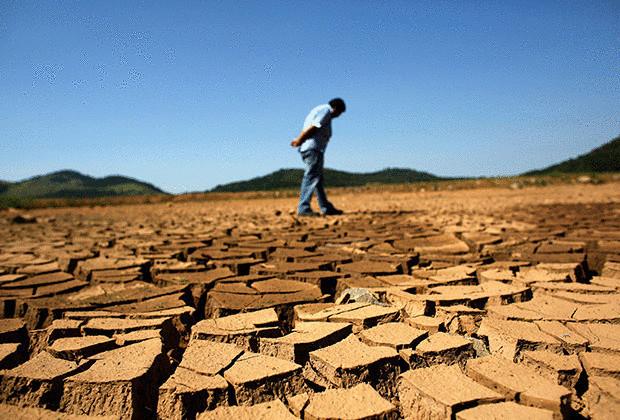
Photo: Nacho Doce / Reuters
Even warming of 4 degrees represents a huge danger to the basic elements of ecosystems, and many of them will not survive. Thus, many countries will be on the verge of extinction — in fact, all 7-8-13 billion people will be on the verge of extinction. Nobody in this situation wins. If to speak about Russia, then perhaps in the North of the country there will be new arable land, but in the South the situation will worsen. The geopolitical situation in such circumstances will inevitably be negative. Perhaps we will see jihadists in Moscow or Paris.
About 83 percent of the land is now under the influence of human activity. More than 90 percent of the organisms performing photosynthesis, is also under the influence of anthropogenic factors. People are still absolutely fantastic way to change the character of the biosphere. If we look at the reduction of microfauna in the soil, we will see that it changes radically. People affects the hydrosphere — the rivers do not reach the seas and oceans, and a typical example of this is the Aral sea. We destroyed about 50 percent of animal species. We are destroying the entire biosphere of the planet, not sparing anyone.
Transhumanism and the reduction of the known world
Despite this apocalyptic picture, people are not yet extinct. What should I do? If to simplify, there are two theories. The first is transhumanism, born and growing in the United States. People think that our technology is 20-30 years will allow to solve the problems described above. Some American rich people freeze their body, paying a lot of money. They hope that after this time, they will revive when the world's problems will go away. Of course, I'm describing it somewhat comical, but the point is this. These people believe that mankind will then be so powerful that, even though we destroy our environment, we will be able to survive.
I think these ideas are crazy, which made no sense. If we are not going to take any effort in 20 years there will be no technology, we will not have the energy and "Paradise on Earth", we are waiting for the nightmare and horror. Such fantasies have never led to anything good, especially if it is assumed that the technology required to implement them, will belong to a small group of very rich people.
Transhumanism continues the ideology of progress. Her supporters believe that progress is the panacea for all ills, and the development of technology in any case will lead to the solution of all problems. But the human race never learned to use them properly. On Earth today there are 65 people owning the equivalent of the annual income of 3.5 billion poorest people on Earth. These 65 people and dream of transhumanism.
Another theory is the reduction of the ecumene — the human environment. Global warming, decline of natural resources, loss of biodiversity, will lead to the emergence of a new environment, a new world, which will be much less and the existence of which is due to the catastrophic consequences of the processes occurring now on Earth.
It seems to me that this interpretation of the situation is not rational, because man is not capable of producing the energy itself, it can only extract, transform and pass it on. In order to do that require energy. Imagine you eat yogurt out of a jar (and in fact it represents the potential energy), and you need a spoon to do it. Its creation will take a lot of energy, and you will not have any strength food.
Inequality, spirituality and negative freedom
We are already living in the anthropocene. The anthropocene is a finite amount of resources, demographic crisis, in which we enter, and so on. According to the proponents of this concept, humanity will have to go the way that it was since the eighteenth century. In 1786 on the planet was not a single region, which would be much richer than the other. Now a large part of the population lives on $ 200 a month. At the same time, there is a country like Liechtenstein, where live some bankers and almost impossible to find a single Baker. GDP per capita it is more than 140 thousand dollars a year. But after a century and a half the quality of life in different parts of the globe will converge. Let's look at some areas of the USA or France — you will be horrified at how impoverished they are.
Such a big city as Moscow, can only live thanks to a very large amount of energy. Imagine how powerful the grid is required to ensure the needs of the metropolis energy. Does this mean that all the people living in such a city work? No, in the 6-million city, according to research, usually 1.5 million citizens are not working. That is, a certain portion of the population made no contribution to GDP, inequality will not go away.
The anthropocene only even out its cruising speed. There is information about the fact that when GDP per capita reaches a value of 15 thousand dollars per year, then immediately begins the divergence between the curve of material wealth and sociological curve of satisfaction with their lives. Beyond this threshold, the person starts to feel differently.
Chasing wealth, well-being, we begin to enter a state of Hyper-consumption, thus creating a threat to future generations. We begin to forget about spirituality. By spirituality I do not necessarily mean religion — there are different its shape. At the dawn of Ancient Greece, for example, it was the fact that if you kill a lot of enemies, then you will remember. But after a few generations the meaning of life of the ancient Greeks was philosophy, thinking and art. See how society has changed over several generations. The Christian perception of a monotheistic religion based on the idea of salvation and achieve eternal bliss in the other world.
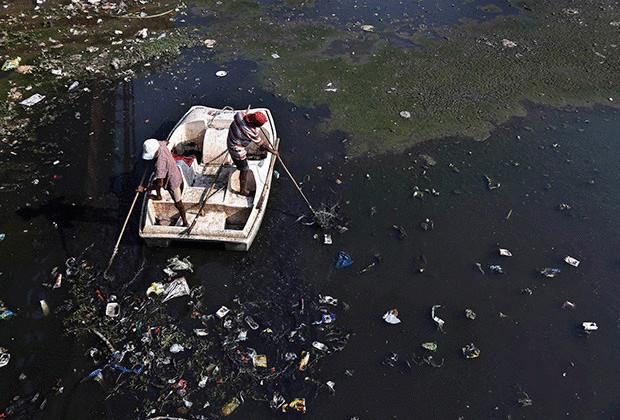
Photo: Mahesh Kumar A. / AP
As you can see, different societies, different spirituality, different ideals. Now, it seems, the meaning of life for us is becoming more and more quality content in a supermarket trolley or the increase in the price of owned person's shares. All this will cast tears of humanity, because sooner or later it will reach the point where even the richest of its representatives will not be able to fulfill their physical desires, to achieve the goals of consumption. Then we will have to rethink their existence.
In the XVII century in Europe there appeared the philosophical concept of so-called negative freedom, which is not thought ancient. It was put forward by Thomas Hobbes, the famous English philosopher, founder of the philosophy of the social contract. Under negative, negative liberty, he understood the freedom of self-restraint.
Some suggest that at the dawn of mankind society almost was not — there were only isolated individuals. But they were not satisfied with the fragmented, atomized existence, and they began to bond, forming a society. They could not use the fruits of their labor fully alone. Thus, the perception of oneself as separate from other beings borders on psychopathy. Some are now saying, that, they say, I live, and society for me, no, because the ancient lived. But society existed almost always.
I live in Switzerland, and therefore give the words of the Swiss political activist of the XVIII century, Benjamin constant. He said that for us Europeans, is not so important to participate in society directly, we want to convey a certain political structures of their rights who need to install this negative freedom for everyone. People are less and less engaged in the issues of their freedoms and more and more passes it some authorities. As for the functions of government, it should protect economic freedom.
I think that this concept will not work, because of the notorious economic freedom could be a positive factor in the time of constant, but now we have too much. The consumption of the poor Parisians not affect the climate, but how to consume rich Paris or Moscow (taking into account that they are becoming more), begins to affect our entire planet. Each of us must realize that negative freedom is nice and all, but when billions are beginning to consume the energy in such a way that it will be bad for our planet.
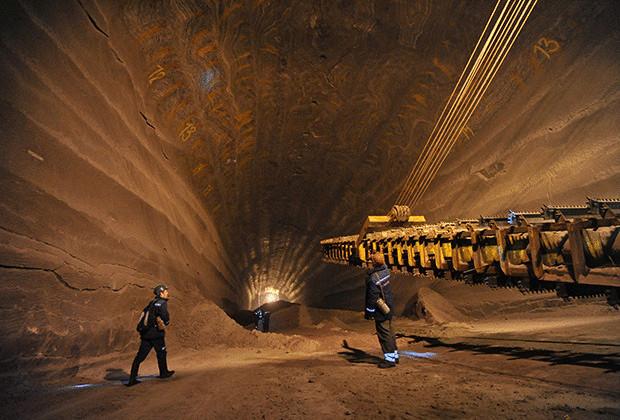
Photo: Denis Vyshinsky / Kommersant
Positive freedom
If we want to survive on Earth, we must enact appropriate laws relating to the limitation of energy consumption, of wealth. Positive, positive freedom must to change negative. It is the subjugation of every norms of the majority. Amartya sen, Indian economist, said that the concept of negative freedom is too abstract, we need to talk about positive liberty. "I am free only when able to do something (education, health, and so forth)", — he said.
But sen is limited by the scale of personality of one man, and now the world begins to think about the possibilities of a collective community that are contrary to the interests of the market and which are not thought liberals. For example, in France in Lyon was recently a conference on climate change. There I talked with farmers, organizing cooperatives, they chipped in and bought a press for the production of biofuels from rapeseed. They do not make sense to consume this fuel only in the circle of his team and they began to sell it.
There are new non-market control mechanisms. They have a lot of potential flexibility for adaptation to the new realities of our lives. The anthropocene will be a time of change in all spheres, including economic and political. He will also be the era of the emergence of new types of freedoms. Human life will open new facets and humanity, besides the obvious problems, there will appear many new possibilities.published
Author: Mikhail Karpov
P. S. And remember, only by changing their consumption — together we change the world! ©
Source: lenta.ru/articles/2015/04/25/antropocen/

Photo: Antara Photo Agency / Reuters
Professor of law, University of Lausanne, French philosopher and expert on climate protection, Dominique Bourg held in the French Institute lecture, in which he described how people change the environment and how to change the life of all humanity into a new geological epoch — the anthropocene. He not only warned of impending extreme weather events all around the world, but also outlined the dramatic changes that will occur in society in connection with them. "Ribbon.ru" recorded the basic provisions of lecture of Dominique Boer.
What is the anthropocene
There is now a very fashionable word — "the anthropocene". The anthropocene is a new geological era, which has entered humanity, lived before the Holocene epoch. The Holocene lasted approximately 11 million years — it was at this time began and ended the big ice age. In this era of climate change occurred without influence on the climate of human activities.
Recently we have entered a new period — the anthropocene, changed the conditions of life on the planet. Some believe that global warming is a positive factor, especially for the Nordic countries, but in fact it is no good carries. For the Holocene was characterized by a stable climate, favourable conditions for agriculture, and on the basis of agriculture developed a great civilization. For centuries humanity has used this situation, these favourable conditions.
But with the beginning of the anthropocene the Holocene has ended and the conditions are totally changed. The anthropocene can be described in terms of three disciplines. First, the stratigraphy section of the Geology layers of sedimentary rocks and the geologic time scale, second, Sciences about the Earth as the system and, thirdly, the so-called "artificialization" how man changed the face of the planet. The anthropocene continues, and every decade we see something new.
In comparison with the beginning of the industrial revolution, carbon dioxide in the atmosphere has increased by 40 percent. Returning tens of millions of years ago, we will see that during this period there were such major changes, as with the 1830-ies to the present day. Clearly, if over millions of years the changes were minor, and all of a sudden there was a splash, then on the Ground really is something enormous.
Another important indicator is the increase of the mass of nitrogen and phosphorus compounds. NOx was three times higher than before human activities. This is particularly evident in some regions. There is a concept "demonstration mountain lakes" (they are in isolated mountainous regions), and in their water and in the coastal zone, there has been growth of a population of unicellular diatoms assimilate salts of nitrogen and phosphorus, indicating that the increase in the concentrations of these elements in the environment. And it takes away from regions where there is industrial activity of man.

Photo: Gerardo Garcia / Reuters
Try to imagine what will happen in the future, if these processes will continue. During the year a person produces more of the rocks out of the ground than susceptible to wind erosion. People actually gnaws the bowels of the Earth, it exploits all possible resources, and after 15 years of deposits, located at depths less than 100 metres, will be almost completely exhausted.
Man invades ecosystems — industrial waste and plastic into the lava of active volcanoes, flowing through populated areas. From its contents one can see how gradually will change the composition of the rocks — because new deposits are already visible traces of plastic. Mankind has invaded almost all ecosystems.
The great Russian scientist Vladimir Vernadsky developed a systematic approach to the study of the biosphere. It shows that mankind really has become a geological force in Earth history, it can not only change the individual geological layers, but also the entire ecosystem as a whole. We humans have become a destructive force on a universal scale. We have broken and the carbon and nitrogen cycles, and of course, we are the cause of global warming, which says it all. The most obvious sign of climate warming, the melting of ice, affecting the tectonic and volcanic processes.
A third interesting conclusion was made by an international team of scientists (their study published in the journal Nature in 2009, as well as new insights in the journal Science in 2015). Measuring the impact of humanity on the Earth in nine factors, they approached the problem from a quantitative point of view, showing that all of the threats associated with the onset of the anthropocene, it is possible to Express in numbers. Here we are talking about the climate and on biodiversity, the oceans (this is very important), depletion of the ozone layer, acidification of oceans, soil management, chemical pollution, use of aerosols, and the introduction into ecosystems of new materials (including plastics).
Researchers have warned about the intersection of qualitative boundaries on climate, biodiversity and nitrogen-phosphorus cycle in 2009, and in 2015 — and the use of the soil (here it is, first of all, talking about the destruction of forests). As if they had "red lines" that allow you to say that we crossed the border of a new era in the history of the Earth.
Man as the enemy of the biosphere
Direct consequences of all these processes, of course, are the increasing temperature and rising global sea level that occur very quickly (it is expected that by the end of the century it will rise by 1-2 meters). The result will go under the water most of the land, and the inevitability of the process have no doubt. Earlier in Earth's history in such a short time, global sea level rose only 25 cm. This will change the cycle of precipitation. Arid regions will become more arid, and humid wetter.
Increase the frequency of various natural disasters. Now in those areas of the Earth where frequent storms and hurricanes, we note a doubling of their occurrence. One example is the Philippine Typhoon Haiyan, the wind speed reached 340 kilometers per hour — it happened two years ago.
Relatively recently we began to understand that carbon dioxide is dissipated in the atmosphere long enough. At the end of this year, the level of carbon dioxide in the atmosphere will be critical. If at the end of this year, the average temperature rises by 2 degrees since the beginning of the century, then in another hundred years, it will rise 5 degrees, and it will be disastrous for all life on the planet.

Photo: Nacho Doce / Reuters
Even warming of 4 degrees represents a huge danger to the basic elements of ecosystems, and many of them will not survive. Thus, many countries will be on the verge of extinction — in fact, all 7-8-13 billion people will be on the verge of extinction. Nobody in this situation wins. If to speak about Russia, then perhaps in the North of the country there will be new arable land, but in the South the situation will worsen. The geopolitical situation in such circumstances will inevitably be negative. Perhaps we will see jihadists in Moscow or Paris.
About 83 percent of the land is now under the influence of human activity. More than 90 percent of the organisms performing photosynthesis, is also under the influence of anthropogenic factors. People are still absolutely fantastic way to change the character of the biosphere. If we look at the reduction of microfauna in the soil, we will see that it changes radically. People affects the hydrosphere — the rivers do not reach the seas and oceans, and a typical example of this is the Aral sea. We destroyed about 50 percent of animal species. We are destroying the entire biosphere of the planet, not sparing anyone.
Transhumanism and the reduction of the known world
Despite this apocalyptic picture, people are not yet extinct. What should I do? If to simplify, there are two theories. The first is transhumanism, born and growing in the United States. People think that our technology is 20-30 years will allow to solve the problems described above. Some American rich people freeze their body, paying a lot of money. They hope that after this time, they will revive when the world's problems will go away. Of course, I'm describing it somewhat comical, but the point is this. These people believe that mankind will then be so powerful that, even though we destroy our environment, we will be able to survive.
I think these ideas are crazy, which made no sense. If we are not going to take any effort in 20 years there will be no technology, we will not have the energy and "Paradise on Earth", we are waiting for the nightmare and horror. Such fantasies have never led to anything good, especially if it is assumed that the technology required to implement them, will belong to a small group of very rich people.
Transhumanism continues the ideology of progress. Her supporters believe that progress is the panacea for all ills, and the development of technology in any case will lead to the solution of all problems. But the human race never learned to use them properly. On Earth today there are 65 people owning the equivalent of the annual income of 3.5 billion poorest people on Earth. These 65 people and dream of transhumanism.
Another theory is the reduction of the ecumene — the human environment. Global warming, decline of natural resources, loss of biodiversity, will lead to the emergence of a new environment, a new world, which will be much less and the existence of which is due to the catastrophic consequences of the processes occurring now on Earth.
It seems to me that this interpretation of the situation is not rational, because man is not capable of producing the energy itself, it can only extract, transform and pass it on. In order to do that require energy. Imagine you eat yogurt out of a jar (and in fact it represents the potential energy), and you need a spoon to do it. Its creation will take a lot of energy, and you will not have any strength food.
Inequality, spirituality and negative freedom
We are already living in the anthropocene. The anthropocene is a finite amount of resources, demographic crisis, in which we enter, and so on. According to the proponents of this concept, humanity will have to go the way that it was since the eighteenth century. In 1786 on the planet was not a single region, which would be much richer than the other. Now a large part of the population lives on $ 200 a month. At the same time, there is a country like Liechtenstein, where live some bankers and almost impossible to find a single Baker. GDP per capita it is more than 140 thousand dollars a year. But after a century and a half the quality of life in different parts of the globe will converge. Let's look at some areas of the USA or France — you will be horrified at how impoverished they are.
Such a big city as Moscow, can only live thanks to a very large amount of energy. Imagine how powerful the grid is required to ensure the needs of the metropolis energy. Does this mean that all the people living in such a city work? No, in the 6-million city, according to research, usually 1.5 million citizens are not working. That is, a certain portion of the population made no contribution to GDP, inequality will not go away.
The anthropocene only even out its cruising speed. There is information about the fact that when GDP per capita reaches a value of 15 thousand dollars per year, then immediately begins the divergence between the curve of material wealth and sociological curve of satisfaction with their lives. Beyond this threshold, the person starts to feel differently.
Chasing wealth, well-being, we begin to enter a state of Hyper-consumption, thus creating a threat to future generations. We begin to forget about spirituality. By spirituality I do not necessarily mean religion — there are different its shape. At the dawn of Ancient Greece, for example, it was the fact that if you kill a lot of enemies, then you will remember. But after a few generations the meaning of life of the ancient Greeks was philosophy, thinking and art. See how society has changed over several generations. The Christian perception of a monotheistic religion based on the idea of salvation and achieve eternal bliss in the other world.

Photo: Mahesh Kumar A. / AP
As you can see, different societies, different spirituality, different ideals. Now, it seems, the meaning of life for us is becoming more and more quality content in a supermarket trolley or the increase in the price of owned person's shares. All this will cast tears of humanity, because sooner or later it will reach the point where even the richest of its representatives will not be able to fulfill their physical desires, to achieve the goals of consumption. Then we will have to rethink their existence.
In the XVII century in Europe there appeared the philosophical concept of so-called negative freedom, which is not thought ancient. It was put forward by Thomas Hobbes, the famous English philosopher, founder of the philosophy of the social contract. Under negative, negative liberty, he understood the freedom of self-restraint.
Some suggest that at the dawn of mankind society almost was not — there were only isolated individuals. But they were not satisfied with the fragmented, atomized existence, and they began to bond, forming a society. They could not use the fruits of their labor fully alone. Thus, the perception of oneself as separate from other beings borders on psychopathy. Some are now saying, that, they say, I live, and society for me, no, because the ancient lived. But society existed almost always.
I live in Switzerland, and therefore give the words of the Swiss political activist of the XVIII century, Benjamin constant. He said that for us Europeans, is not so important to participate in society directly, we want to convey a certain political structures of their rights who need to install this negative freedom for everyone. People are less and less engaged in the issues of their freedoms and more and more passes it some authorities. As for the functions of government, it should protect economic freedom.
I think that this concept will not work, because of the notorious economic freedom could be a positive factor in the time of constant, but now we have too much. The consumption of the poor Parisians not affect the climate, but how to consume rich Paris or Moscow (taking into account that they are becoming more), begins to affect our entire planet. Each of us must realize that negative freedom is nice and all, but when billions are beginning to consume the energy in such a way that it will be bad for our planet.

Photo: Denis Vyshinsky / Kommersant
Positive freedom
If we want to survive on Earth, we must enact appropriate laws relating to the limitation of energy consumption, of wealth. Positive, positive freedom must to change negative. It is the subjugation of every norms of the majority. Amartya sen, Indian economist, said that the concept of negative freedom is too abstract, we need to talk about positive liberty. "I am free only when able to do something (education, health, and so forth)", — he said.
But sen is limited by the scale of personality of one man, and now the world begins to think about the possibilities of a collective community that are contrary to the interests of the market and which are not thought liberals. For example, in France in Lyon was recently a conference on climate change. There I talked with farmers, organizing cooperatives, they chipped in and bought a press for the production of biofuels from rapeseed. They do not make sense to consume this fuel only in the circle of his team and they began to sell it.
There are new non-market control mechanisms. They have a lot of potential flexibility for adaptation to the new realities of our lives. The anthropocene will be a time of change in all spheres, including economic and political. He will also be the era of the emergence of new types of freedoms. Human life will open new facets and humanity, besides the obvious problems, there will appear many new possibilities.published
Author: Mikhail Karpov
P. S. And remember, only by changing their consumption — together we change the world! ©
Source: lenta.ru/articles/2015/04/25/antropocen/


